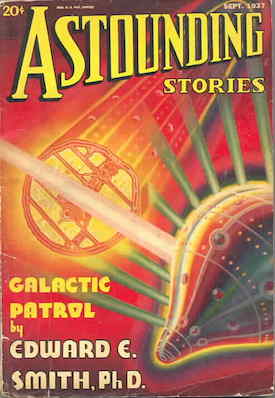
Don’t take a space axe to a Q-beam fight.
“The bad guys are very good”, said Dan Schulman, a group president with American Express, as he talked about the biggest problem he faces in maintaining security for a global credit card company. He was speaking at the MobileCon tradeshow in San Jose earlier this year, but his words could have been lifted from the pages of vintage science fiction.
Edward E. Smith – Doc Smith – started writing what would become the Lensman series of novels in 1934. The dashing tales of outer space adventure centered on a galactic corps of patrolmen who fearlessly battled forces of evil beyond human imagination. Not unlike the continuous cyber war waged against the foundations of our electronic economy here on Tellus, um, Earth.
Similarly, the central problem for Smith’s Galactic Patrol was foolproof authentication…
We need something which will identify any representative of Civilization, positively and unmistakably, wherever he may be. It must be impossible of duplication, or even of imitation, to which end it must kill any unauthorized entity who attempts imposture. It must operate as a telepath between its owner and any other living intelligence, of however high or low degree, so that mental communication, so much clearer and faster than physical, will be possible without the laborious learning of language.
Needless to say, they didn’t rely on a small piece of plastic with a 1970s vintage magnetic strip. Their solution, provided by the most sublimely intelligent race in the galaxy, was the Lens, a telepathic wristband mated to the mind of its wearer. In the wake of the Target mega-crack, credit card companies, banks and retailers need to start thinking like a pulp writer from the 1930s.
